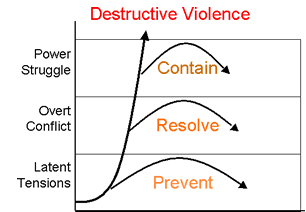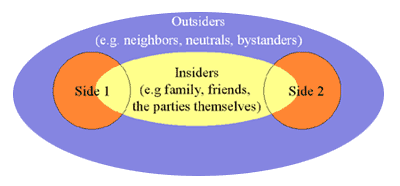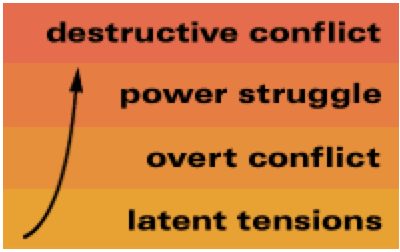Provider – Enable People to Meet Their Needs
Conflict usually arises in the first place from frustrated needs, like love and respect. Frustration leads people to bully others, to use violence, and to grab someone else’s things. The most basic human needs include food (and other necessities for living), safety, identity, and freedom. If we as Thirdsiders can help people address one or more of these four needs we can avert destructive conflict. This is the role of the Provider.
Share resources, share knowledge
When people feel that there is not enough to go around for everyone, fear and anxiety rise and fights may break out. Hungry people can scarcely be blamed for coveting the food of their well-fed neighbors. Not coincidentally, those societies that share their resources most equitably, such as the Scandinavian nations, have relatively low rates of crime and violence.
- “Lagom” is a Swedish expression used when passing food or drink around the table, meaning “Take just enough so that there is enough for everyone.”
Enough food exists for everyone and the cost of purchasing and distributing it would be a minuscule portion of what is spent on arms and armies. The same holds true when it comes to addressing any of the elementary material needs of human beings such as clean water, warm clothes, simple medical care, and shelter from the elements.
Just as important as sharing scarce resources is sharing knowledge, educating people so that they can meet their own needs. As the old adage goes, “Give a man a fish and you feed him for a day. Teach a man to fish and you feed him for a lifetime.”
- Boston’s success in reducing teenage violence stemmed in part from the community, business, and government working together to provide over ten thousand after-school jobs for teenagers at risk, along with educational programs and job training. Churches in Rio de Janeiro aim to do the same by educating poor young men for jobs other than selling drugs.
- Peace does not require great prosperity. Consider the little country of Costa Rica, not rich despite its name, but with a record of internal and external peace during the last half of the twentieth century that any of the rich nations might envy. The Costa Ricans achieved this record by eliminating their army and using their resources instead for health, education, and development. For many years, Costa Rica spent a larger percentage of its government budget on health than any other country in the world. It had the second highest education budget, proportionally, in the world. While expensive, these social programs were credited with helping head off the immensely more costly social uprisings and revolutions that occurred in almost all of Costa Rica’s neighbors in Central America.
Give others a sense of security
- Medieval England had an estimated homicide rate of fifty per hundred thousand inhabitants. Today, England’s rate is less than one twenty-fifth of that. One major reason is that people feel safe. Police are present. No one feels compelled, indeed no one is allowed, to carry a weapon. The community provides protection for everyone.
The same lesson is being learned at the international level.
- During the first half of the twentieth century, the nations of Europe engaged in arms buildups that inflamed fears, triggered arms races, and led to catastrophic wars. Nations sought to make themselves feel more secure by making others feel less secure – and it did not work. In the 1970s and 1980s, European nations began to learn to respect the security needs of others. To reduce fear and distrust, they agreed to exchange military observers and to notify neighbors before carrying out military exercises. No nation, they came to recognize, can feel truly secure unless its neighbors do too. True security lies in common security.
Offer respect
Human beings have a host of emotional needs – for love and recognition, for belonging and identity, for purpose and meaning to their lives. If all these needs had to be subsumed in one word, it might be “respect.” People want to be recognized and respected for who they are.
The frustration of these needs creates conflict everywhere. In families, children competing for parental attention fight frequently. In the neighborhood, teenagers join gangs in order to feel a sense of belonging; they regularly kill each other because of a perceived lack of respect. In the workplace, the struggle for recognition and meaning can escalate, sometimes even into violence. Most of the wars in the world today revolve around identity and respect. Disrespect for a group’s identity – and other basic needs – leads naturally enough to demands for a separate state that will address those needs, demands which in turn can trigger civil war.
By addressing young people’s needs for meaning and respect, we as parents, teachers, and community members can help avert violence.
- In Milwaukee, a midnight basketball program was credited with a thirty percent drop in teenage violence; young men preferred to shoot baskets rather than to shoot each other.
- Similarly, noting that the hours just after school are peak hours for youth crime, dozens of communities around the United States have organized “homework clubs” that offer young people the chance to engage in stimulating activities after school. In one Florida town, for example, violent crime committed with guns dropped seventy percent in neighborhoods where homework programs operate.
Providing respect also proves critical in reducing ethnic violence. In a world of more than six thousand intermixed ethnic groups, the solution cannot be a state for every ethnic group. Strong national cultures can survive without their own state – but only if the larger community respects their identity and their right to express it – as Catalans in Spain, Tamils in India, and Welsh in Great Britain can attest.
- When asked why his Bosnian city has enjoyed more ethnic tolerance than so many of its neighbors, Mayor Selim Beslagic explains, “In Tuzla, we have always given priority to respect for human dignity over belonging to a nation or an ethnic community.”
Empower others
The need for autonomy, for exercising a measure of control over one’s life, runs deep. Even small children want to be able to do things themselves without help from adults. Teenagers struggle to define their identity as separate from their parents. Indeed, many of the wars of the last two centuries have been fought to secure freedom – freedom from feudalism and absolute monarchy, freedom from the grip of colonial powers, freedom from right-wing or left-wing dictatorships, and freedom from the domination of other ethnic or religious groups.
Providing freedom can begin in the family when parents invite young children to make their own decisions whenever possible: “Would you like to wear this outfit or that one?” It can continue at work where companies are learning that getting the most out of their employees requires freeing them to make as many of their own decisions as possible.
Brief bibliography
- Bornstein, D. (1997). The Price of a Dream: The Story of The Grameen Bank. Chicago: University of Chicago Press.
- Burton, J. (1990). Conflict: Human Needs Theory. New York: St. Martin’s Press.
- Gurr, T. (1970). Why Men Rebel. Boulder: Westview Press.
- Dollard, J., L. Doob, N.E. Miller, O.H. Mowrer, and R.R. Sears. (1939). Frustration and Aggression. New Haven: Yale University Press.
- Maslow, A. (1987). Motivation and Personality (Third Edition). New York: Harper and Row.
- Ury, William (2000). The Third Side:Why We Fight and How We Can Stop New York: Penguin.




